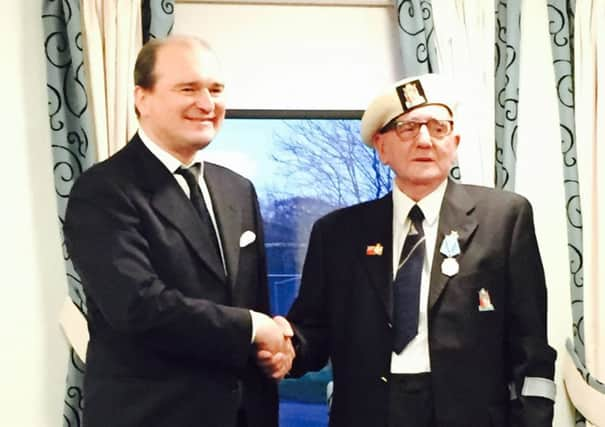Obituary: Alexander Ramsay, Arctic Convoy veteran and bus driver


Alex Ramsay was a mere 16 when, too young to be conscripted but determined to follow his brothers into the forces during the Second World War, he joined the Merchant Navy.
After giving up his job as a parcel boy with the General Post Office for a life at sea he made voyages to New York and Montreal. But within months the teenager sailor found himself at the heart of some of the most crucial and punishing missions of the conflict – battling not only the enemy but the elements on the Allied Arctic Convoys to Russia.
Advertisement
Hide AdAdvertisement
Hide AdIt would be another 70 years before the stoicism and courage of the convoy crews was recognised but the day he was presented with the Ushakov Medal, on behalf of those their sacrifice at sea had supported, was one of the proudest moments of his life.
In the interim he had married, become a bus driver, father, grandfather and great-grandfather but he never forgot the indescribable cold nor the camaraderie that helped him endure the ordeal faced by all those who made the trips that Churchill called “the worst journey in the world”.
Born in the centre of Edinburgh, in Blackfriars Street in the Canongate, he was the youngest of five children – four sons and a daughter. Aged five, he moved with his family to Craigentinny Road but after his mother died when he was 11 he was raised by his mother’s cousin, Peggy, whose son Jimmy he regarded as a fourth brother.
Young Alex left school at 14 to start work with the GPO. By this time the war was in its second year and, as it dragged on, and with his older brothers serving their country – two in the navy and one in the army – he too wanted to do his bit.
Still only 16 he was unable join up and fight abroad but when he spotted some publicity, announcing that the Merchant Navy was looking for young men aged 16 and over, he knew he had found an opportunity. He applied and was accepted, joining in January 1944.
After a couple of weeks at the Catering Training School he began his naval career as a cabin boy, sailing on the SS Hartlepool that February. Then between August and November that year he served on board the Lucerna.
It was after he joined his next convoy at Leith, not knowing where they were bound, and disembarked at Greenwich to be measured for Arctic clothing, that he discovered their destination was somewhere cold. The uniform included a duffel coat, leggings and boots and his wages amounted to £15 per month plus £10 danger money.
The Lucerna left Loch Ewe in Convoy JW 60 on 15 September, 1944, heading for the Russian port of Murmansk on the Kola inlet – a freezing journey, fraught with danger. The tanker was an escort oiler carrying fuel, the most vulnerable ship in the convoy, and it sailed in the centre to provide more protection from marauding U-boats and Luftwaffe planes.
Advertisement
Hide AdAdvertisement
Hide AdYears later he would describe the terrible conditions to his family, recalling the heavily ice-encrusted vessels and the unbearable cold. Temperatures could plunge to -50 and more than 3,000 men perished in the missions to beat the German blockade of Russia by ferrying vital supplies of food and equipment across the treacherous seas.
It was the extraordinary team spirit among the crew on these atrocious journeys that sustained him and after surviving the Arctic he went on to sail in the Mediterranean and off North Africa. After one such trip he discovered his brother Willie had actually been on the same ship. His post-war travels included trips to Bombay and Egypt.
When Peggy’s son Jimmy was getting married Alex managed to get shore leave to be Jimmy’s best man and when he first set eyes on the bride’s sister Louisa, known as Louie, he knew she was the girl he would marry.
After a year’s long-distance courtship the couple wed in August 1950 and a year later their daughter was born, followed in 1954 by a son. He left the Merchant Navy, with the rank of 2nd steward, in 1952 and worked as a bus conductor with Edinburgh Corporation Transport, later becoming a bus driver and one of the first trained to operate on the Edinburgh Airport run. He retired, due to ill-health, in 1982.
A keen golfer and bowler, he played and won many trophies at Braid Hills Golf course and was a member of the Tramways Bowling Club in Edinburgh’s Pilrig.
He lived latterly in sheltered housing at the city’s Milton Court where, in December last year, the Russian Consul General in Scotland, Andrey Pritsepov, presented him with the Ushakov medal – an award to acknowledge the personal courage and valour shown by those on the Arctic Convoys whose fortitude on the so-called “suicide missions” provided a vital lifeline to his country.
Predeceased by his wife Louie in 2007, he is survived by his daughter Christine, son Stuart and extended family.